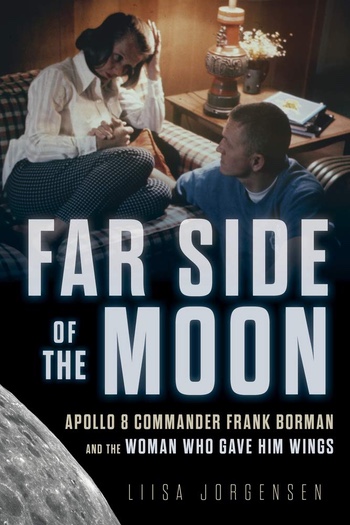Review: Far Side of the Moonby Jeff Foust
|
| As Jorgensen succinctly put it: “Frank took the risks—she absorbed the fear.” |
Jorgensen profiles an astronaut whose marriage did not end in divorce: Frank Borman celebrated the 70th anniversary of his marriage to his wife Susan in 2020. Nonetheless, it was not without stress, one that led to a nervous breakdown and hospitalization of Susan Borman a few years after Frank Borman left NASA. The book chronicles that intertwined life, and how a relationship pushed to the breaking point grew stronger over the years.
The stresses on the marriage came from several factors, Jorgensen argues, not the least of which was Frank’s career as an Air Force pilot and NASA astronaut, which put his life at risk. At the same time, Susan was told, as a military wife, to subordinate her life to his: “it was as important as your religious faith to be completely dedicated to your husband.” As Jorgensen succinctly put it: “Frank took the risks—she absorbed the fear.”
That was complicated by Susan’s own life: her father died while she was growing up and she had a strained relationship with her mother, who wrongfully blamed her for her father’s death. She had to internalize all the stress she experienced, unable to share it with Frank, who was often away for long periods while in the military and at NASA. She hid that most of the time, although an exception was watching the Apollo 8 launch from her home: photos clearly showed how worried she was about a mission that NASA officials privately acknowledged to her beforehand had a 50/50 chance at success.
Susan Borman reached the breaking point after Frank left NASA to become an executive at Eastern Airlines. “No boys to take care of. No military wives to get together with. It was just her and the voices in her head, and they wouldn’t stop,” Jorgensen writes. After a lengthy stay at an institution, Susan recovered, while Frank rededicated himself to a marriage he had long been absent from.
Jorgensen based the book on extensive interviews with Frank Borman and friends and family, as well as correspondence that Frank had saved over the decades; Susan, diagnosed with Alzheimer’s several years ago, was no longer able to speak by the time that Jorgensen started working on the book. The book includes extensive recreations of dialogue presumably from the memories of Frank and others. One wonders about the accuracy of such recollections, given the flaws of memory, but they do presumably communicate the intent of what was discussed, if not a word-for-word recollection.
Far Side of the Moon shows how the wives of early NASA astronauts dealt with stress that was hidden from public view, and even from their own husbands. That stress destroyed some relationships, but in the case of the Bormans, helped to eventually forge a much stronger bond.
Note: we are using a new commenting system, which may require you to create a new account.
